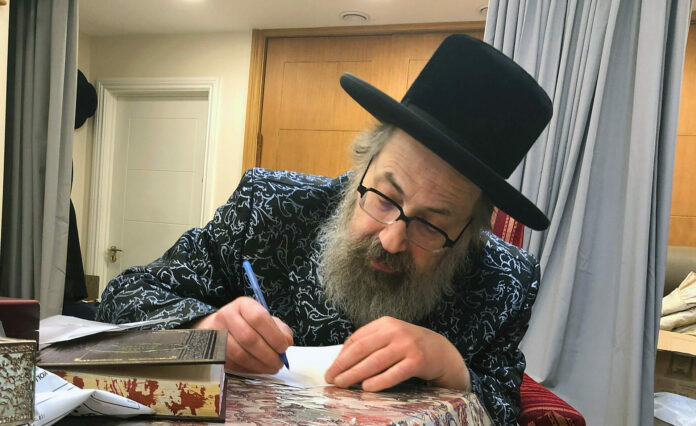One of the leading rebbes of Europe today is the Vizhnitzer Rebbe of London, Rav Dovid Hager, shlita. Based in the Stamford Hill area, which boasts the largest concentration of chasidic Jews in Europe, he leads a sizable kehillah known as Khal Imrei Chaim D’chasidai Viznitz. Due to his outstanding piety, scholarship and charisma, the Rebbe has drawn numerous followers and admirers from throughout the continent. His unabashed message to the global Jewish community about the ideal of peace has resonated throughout the world.
The Rebbe has issued numerous missives on this subject, pleading with individuals and communities to end discord and live in harmony with each other, citing his own family as an example. After the passing of his father—Rav Mordechai Hager, the Vizhnitzer Rebbe of Monsey, on 29 Adar 5778—the Rebbe’s seven sons and one grandson (the eldest son of his eldest son, who predeceased him) were amicably appointed to succeed him as rebbes in their respective communities. This can serve as a model for other communities on how to appoint a successor, or more accurately successors, upon a rebbe’s passing. The Rebbe, who has been battling an illness for the past year and a half, has been vocal about this issue even from the confines of a hospital bed.
When I met him recently in the room where he receives his chasidim, the Rebbe spoke to me vigorously at length, frequently taking out a pen and paper to organize and record his thoughts about his life’s mission to bring the blessing of peace to klal Yisrael.
The Megillah uses the term “Divrei shalom ve’emes.” However, Chazal tell us (Sanhedrin 6b) that shalom and emes can sometimes be in conflict. Moshe Rabbeinu’s middah was emes. His motto was therefore “yikov hadin es hahar—let the strict letter of the law pierce the mountain.” Aharon, by contrast, sought compromise between disputants, as he “loved peace and pursued peace.” The Rebbe’s father was known as an ish emes, a man of uncompromising truth.
I’ll tell you a story about my father. Someone once asked him to attend a chasunah. He usually went to that family’s simchos, but this was already the second generation of children getting married. This person kept bothering him about it until my father finally said that he would consider it. Afterwards, my father told me he wasn’t sure if he had been allowed to say that. “When someone says that he’ll consider something, it means he has a doubt and has to think about it. I didn’t have a doubt. I knew I couldn’t go. I only said that because he was pestering me so much.” It bothered him that he might not have been fully truthful.
Emunah is dependent on emes, because if you don’t go with the emes it means that you don’t have emunah. In other words, you think you’re going to lose by sticking to the emes. The Gemara says that Chavakuk summarized the Torah in one phrase: “tzaddik be’emunaso yichyeh.” If someone tells a lie, it demonstrates that he doesn’t have emunah, because if he did he wouldn’t feel the need to lie. The fact that he thinks that there’s something to be gained by it shows his lack of faith.
At the same time, my father was a peacemaker. He once told someone who had managed to get the two sides of a big dispute to make peace with each other that he envied his portion in Olam Haba.
My father never referred to disagreements that end up in beis din as “dinei Torah,” because the term itself has negative connotations. He would say that the two parties were going to “ask some rabbanim a shailah.”
There are a lot of shailos the answers to which are unclear, and if it’s a shailah in Choshen Mishpat, it’s important to have rabbanim who are familiar with those halachos. No one wants to have someone else’s money. If you ask anyone, “Do you want that person’s money?” he’ll answer, “No, I only want my own money.” That’s why we have to find out whose money it is. That is all that dinei Torah are meant to be.
But it’s hard for people to see it that way, because their self-interest gets in the way.
Yes, it’s very difficult. The problem is that each side sees only maalas atzmo. It’s human nature, and that’s the way it is in every machlokes. I believe that if a person is mevateir and ignores what others do to him, in the end he will have infinite hanaah from it. It’s a little hard at first. The fact is that there are two sides to every story. But everyone should remember that a din Torah doesn’t mean machlokes. Don’t concentrate on the words “din Torah.” All it means is that when we have a shailah, we go to ask the Torah for the answer. The terminology we use is very important.
I spoke to a rav this week who pointed out that Sefer Bereishis is full of machlokes, starting with the moon and the sun.
We find machlokes throughout the Gemara as well. Yet the Gemara also says that the proponents of each point of view were meshadech with each other because it wasn’t ever personal; they simply had differing opinions. There’s nothing wrong with having different opinions.
But those disputes were over spiritual matters, not monetary ones.
Whenever there’s a dispute over money, every person needs to tell himself—as well as state publicly—that despite the disagreement, it must never lead to hatred and controversy. After all, each party only wants what is rightfully his and nothing more. Since it’s difficult for a person to remain objective because of his natural self-interest in a positive outcome for himself, the two parties must go a beis din for guidance and an answer to what belongs to whom according to halachah.
They must accept the final judgment of the beis din free of any emotion or misgivings, in the same way one asks a rav a question related to kashrus. The ruling must be accepted without reservation and without trying to find another rabbinical panel to rule in your favor. Even in a case where the other party may have misled the beis din and actually caused you to lose money unfairly, you should forgive him and move on. A person must remember that nothing whatsoever is gained by perpetuating a controversy for years.
To read more, subscribe to Ami





















